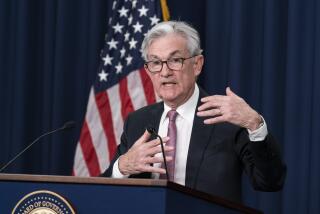Personal Income Growth Slows in May
- Share via
Personal income growth slowed sharply in May while consumer spending didn’t increase at all, but analysts viewed the weakness as temporary and not a signal of a serious slowdown of the economy.
The Commerce Department said that personal income rose 0.2% in May, far below the 0.6% increase in April. It was the worst showing since a January decline of 2.5%. The slowdown was attributed to the weak increase in jobs in May.
Consumer spending, which accounts for two-thirds of total economic activity, was unchanged in May after having risen 0.6% in April. The slowdown in spending was attributed to unusually cold weather in May which caused retail sales to decline for the first time since last August.
Analysts also noted that sales of autos fell sharply in May, which depressed overall spending. However, they believe that auto sales rebounded in June as carmakers resorted again to the use of sizable sales incentives.
“The vagaries of the labor market and motor vehicle purchases depressed May’s numbers, but that doesn’t mean a whole lot given what could happen in June,” said economist Joel Naroff. “June looks to be a big month for vehicles and that implies a large increase in durable goods spending.”
Disposable income, the amount left after paying taxes, rose 0.2% in May, compared with a 0.5% increase in April, the Commerce Department said.
Economists believe that income growth will rebound in the coming months because they see the weak gain of 78,000 jobs in May, the smallest increase since August 2003, as a temporary slowdown and not the start of new problems for the labor market.
The unchanged level of consumer spending reflected the fact that retail sales fell 0.5% in May as cool weather hurt sales of summer clothes and auto sales took a tumble.
An inflation gauge that is tied to consumer spending rose 0.2% in May after a 0.1% increase in April. This inflation measure, which excludes food and energy, is closely watched by officials at the Federal Reserve for signs of price pressures.
Americans’ personal savings edged up slightly in May to 0.6% of disposable income, compared with 0.5% in April.
In other economic news, the Commerce Department said that the United States’ net debtor position rose a sharp 15.2% in 2004, underscoring the deterioration in the country’s international balance sheets.
The U.S. is the world’s largest debtor country with foreigners owning $2.48 trillion more in U.S. assets such as stocks, bonds and real estate than Americans own in foreign assets. In 2003, the investment gap totaled $2.15 trillion. The increase reflected last year’s record trade deficit, which foreigners finance by acquiring more U.S. assets.
In a third report, the Labor Department said the number of Americans filing new claims for unemployment benefits fell last week for a second straight week, suggesting some strength in the labor market.
The drop last week was 6,000 to a total number of new claims of 310,000, the lowest level since mid-April.
More to Read
Inside the business of entertainment
The Wide Shot brings you news, analysis and insights on everything from streaming wars to production — and what it all means for the future.
You may occasionally receive promotional content from the Los Angeles Times.










